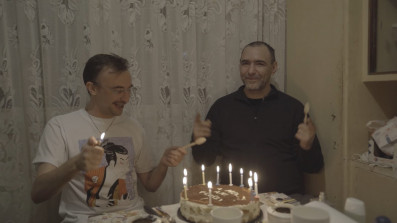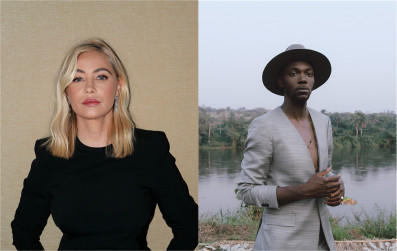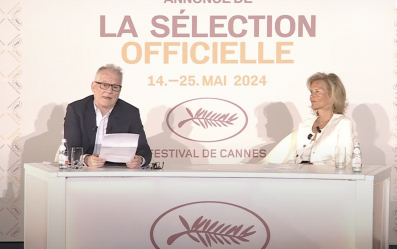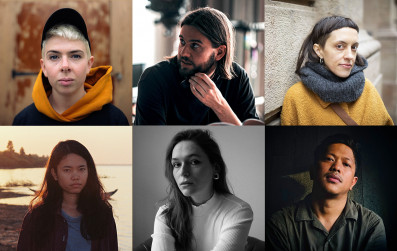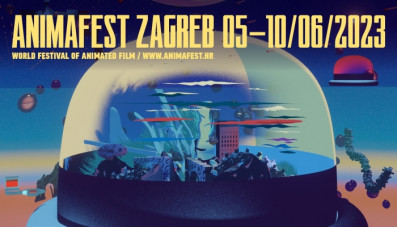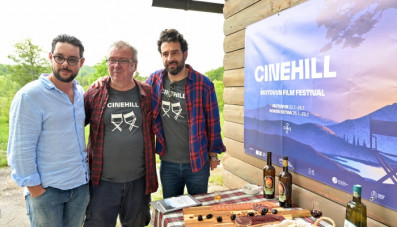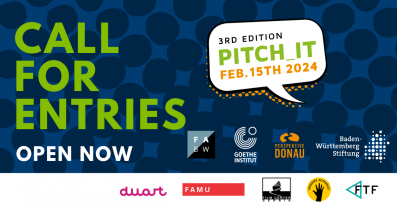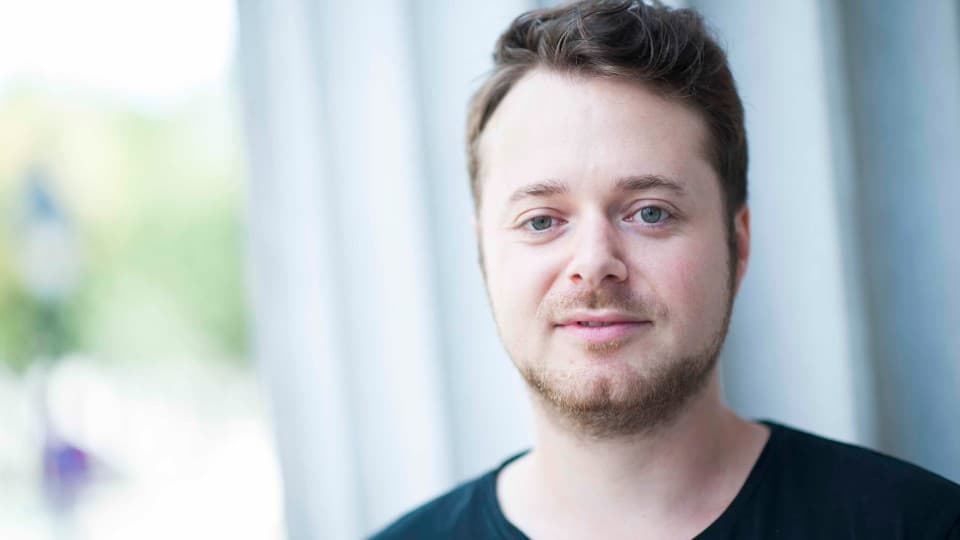
Interview with Jannis Lenz the director or "Battlefield"
Film presented in Shorts selection at Sarajevo Film Festival
Jannis Lenz, born in Filderstadt, collected his first camera and directing experiences by filming himself and his friends doing Parkour, performing art in an urban environment. Currently, he is a Master Student in Directing and works as a study assistant at the Filmakademie Wien with Michael Haneke and Wolfgang Murnberger. His latest short film Battlefield premiered at 26th Sarajevo Film Festival, so our Tettyo Saito did an interview with the author.
First, why did you want to be a film director? How did you become a director?
As a teenager, I discovered the art of movement, Le parkour and Freerunning, which is about overcoming walls and obstacles in public spaces. For practice purposes and finally, for the exchange with other traceurs via YouTube, I bought my first mini DV camera and from then on I constantly filmed me and my friends during our training sessions in an urban environment. I did an internship at a small production company so I could edit my little videos into clips after business hours.
Finally, I tried my hand at the first little stories and narrative shorts with which I then applied to the Vienna Film Academy and, luckily, was accepted at the first attempt. There I met good friends and irreplaceable companions with whom I still work with today.
When you started to be interested in film, what films did you watch? And what films could you watch at the time in Austria?
As a teenager, I could not afford to go to the cinema often but I rent Films in a video library as often as possible. That was cheaper and I could watch the films at least 2 or 3 times when I rented them over the weekend.
One of the first films that I watched over and over again as a teenager was Larry Clark's KIDS. Then I discovered the films of Harmony Korine, David Lynch, Werner Herzog,
R.W. Faßbinder and so on.
What is the starting point of Battlefield? Your own experience, news in Austria or other things?
The fact that my film Battlefield was created was actually a coincidence that arose during research for my upcoming project. Back then I didn't know why, but I was totally fascinated by these gardening soldiers.
My DOP didn't quite understand why I need these pictures and why he should film more and more of them, but he also found it interesting and so we collected material without knowing exactly what for.
In the Editing room, I finally understood why this process, where men in uniforms cut down weed with noisy machines day by day, shot in very wide angle was so fascinating for me. It turned out to be a perfect metaphor for social structures and ways of thinking with which I was confronted in different parts of my everyday life.

You say in the Director's statement that you're "Inspired by the quote of Austrian Expressionist, Oskar Kokoschka: "Weeds are nature ́s opposition to the governance of gardeners". And it's impressive that you connect this quote to the army and their daily life. How did you come up with this incredible idea?
I am a very curious person and go through life attentively. So I often carry very different ideas and thoughts with me over a longer period of time. Now and then these things come together and something new, unexpected emerges from that. That was the case with Battlefield, too. I love contrasts in life and to see which effects unfold when I bring them together. This kind of intuitive and open process, in general, is very important for me and my work, because I believe that life itself is much more exciting than anything I can invent and that people will feel this vitality and originality in the finished film.
I'm interested in the place where the film sets. It might be an army base, but at the same time, it seems a utopia full of verdant plants and a cemetery of tanks. Very strange place. Where is this place? Famous place in Austria? How did you choose here for shooting Battlefield?
It is a magical, hidden place in a rural area of Austria where you usually don´t get access to.
And one of the impressive things is its cinematography by Jakob Fuhr. His eyes are so keen that it makes this film observational and picturesque simultaneously. How did you construct this unique style of cinematography with Mr. Fuhr?
I have worked with Jakob on numerous short and experimental films during the past years. That is how we build a relationship of mutual creative trust. It's not about the depiction of reality but about the inner truth of a story, a person or a place. How can we communicate this and how can we express our inner personal attitude through an outer photographic attitude?
To me, Battlefield is a simple yet intelligence short film about masculinity. Soldiers don't prepare for war, but they try gardening in a peaceful atmosphere. The world in this film is like a utopia after the soldiers are liberated from toxic masculinity. How did you think about the current situation of masculinity in Austria or the world? And how do you think about the future of masculinity? Battlefield seems to offer an answer to it for me.
I believe or hope that we are in a time of upheaval. Women have shown the way and achieved a lot of positive things with their fight for equality and emancipation, now it is up to the men to free themselves from long-outdated role models in order to come one small step closer to an open, diverse and peaceful society.
How is the current situation of Austrian cinema? From the outside, it seems very good. After Jessica Hausner, there are many talents at the prestigious film festival like Marie Kreutzer at Berlin, Lukas Marxt at Venice, Markus Schleinzer at Toronto. But from inside, how do you see the current situation?
Many talents are coming up right now, but as in any other country, in Austria, there is not enough money from funders either to guarantee those talents to keep on working more or less regularly. To make one film every 3-5 years would already be a success. So this brought quite a competition between the talents because of the funding money, where those talents are directly competing with heavyweights such as Michael Haneke, Barbara Albert, etc. So right now there is a wave of solidarity between the up and coming filmmakers in order to push through on a political level a special funding-pot for new talents only. Let’s see if this is working out.
When cinephiles want to know Austrian film history, what films should they see? And why?
I think film and its perception is something very individual and therefore, I would like to recommend filmmakers who fascinated me early on and who still inspire me in my personal work. That would be the work of Tizza Covi and Rainer Frimmel, Jessica Hausner, Ulrich Seidl, Valeska Griesebach or Nikolaus Geyrhalter. With all these artists, it would be very difficult to recommend a specific film because, for me, they represent a complex oeuvre that enables me to immerse myself into a very special world or to perceive the current world from a completely new perspective.
If you choose one favourite Austrian film, what film do you choose? And I want to know why. Is there a personal memory?
I cannot commit myself to a single film. But I have a personal connection to the work of Tizza Covi as well as to the films of Jessica Hausner. Jessica was my mentor during my studies at the film academy for a while and has also helped me afterwards with her incredibly accurate feedback on my short films, so also with Battlefield.
And I am very happy to have Tizza Covi as the dramaturgical consultant for my current film “Soldat Ahmet”, which will also be my first feature film. Tizza helped me a lot with her experience and empathy to get this slowly growing long time project on the right track.
Do you have a plan to make a new short or feature? If so, please tell our readers about it.
We are currently in the post-production of my first feature film project “Soldat Ahmet”, a documentary with fictional elements. The film was shot with the same team I also worked on the Battlefield. The film is a portray about Ahmet, a professional soldier and boxer who has not cried anymore since he was 13 years old. Out of the need to deal with his emotions, Ahmet takes acting lessons. The desire to combine his everyday life with the increasingly important passion for acting threatens to fail in the prejudices of the people around him - in the familiar environment with its tight structures as well as in the seemingly liberal world that has opening up to him. Besides that, I am also working on a script for my next feature film, together with a Viennese Production Company and I am in production for another short which is an experimental documentary, mainly produced in Germany. I am very happy that I can work on these very different projects and I´m looking forward to next year.
Written by: Tettyo Saito



